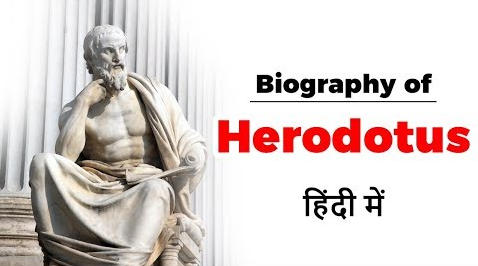Table of Contents
EARLY LIFE
- Herodotus was born in about 485 B.C. in the Greek city of Halicarnassus, a lively commercial center on the southwestern coast of Asia Minor.
- He came from a wealthy and cosmopolitan GreekCarian merchant family. Herodotus’ family opposed Lygdamis’ rule and was sent into exile on the island of Samos.
- When he was a young man, Herodotus returned briefly to Halicarnassus to take part in an abortive anti-Persian rebellion. After that, however, the writer never returned to his home city again.
FATHER OF HISTORY
- Instead of settling in one place, Herodotus spent his life traveling from one Persian territory to another. He crossed the Mediterranean to Egypt and traveled through Palestine to Syria and Babylon.
- He headed to Macedonia and visited all the islands of the Greek Archipelago.He sailed through the Hellespont to the Black Sea and kept going until he hit the Danube River.
- While he traveled, Herodotus collected what he called “autopsies,” or “personal inquiries”: He listened to myths and legends, recorded oral histories and made notes.
FATHER OF HISTORY
- When Herodotus was not traveling, he returned to Athens; there, he became something of a celebrity. He gave readings in public places and collected fees from officials for his appearances.
- In 445 B.C., the people of Athens voted to give him a prize of 10 talents–almost $200,000 in today’s money– to honor him for his contributions to the city’s intellectual life.
FATHER OF HISTORY
- Herodotus spent his entire life working on just one project: an account of the origins and execution of the Greco-Persian Wars (499–479 B.C.) that he called “The Histories.”
- The work begins, of the inquiry of Herodotus of Halicarnassus.It was also an attempt to explain the conflict–“to show what caused them to fight one another,” Herodotus said–by explaining the Persians’ imperial worldview.
- Most of what we know about the Battle of Marathon is from Herodotus.
FATHER OF HISTORY
- Earlier writers had produced what Herodotus called “logographies”: These were what we might call travelogues, disconnected tales about places and people that did not cohere into a narrative whole.
- After Herodotus died, editors divided his Histories into nine books. (Each was named after one of the Muses.) The first five books look into the past to try to explain the rise and fall of the Persian Empire.
- They describe the geography of each state the Persians conquered and tell about their people and customs.
FATHER OF HISTORY
- The next four books tell the story of the war itself, from the invasions of Greece by Persian emperors Darius and Xerxes to the Greek triumphs at Salamis, Plataea and Mycale in 480 and 479 B.C.
- Herodotus’ encyclopedic method did not leave much room for analysis. He treats every piece of his narrative, from the main themes to the digressions and from the facts to the fictions, with equal importance.
Biography Free PDF






















 WhatsApp
WhatsApp